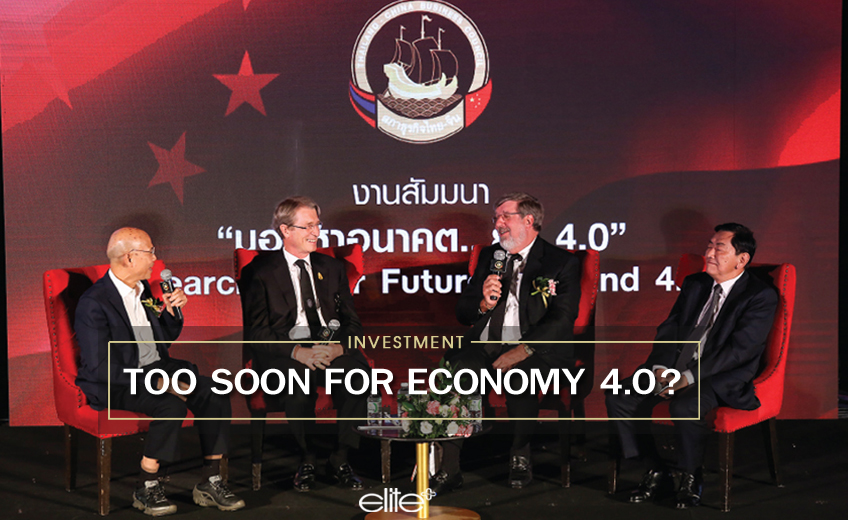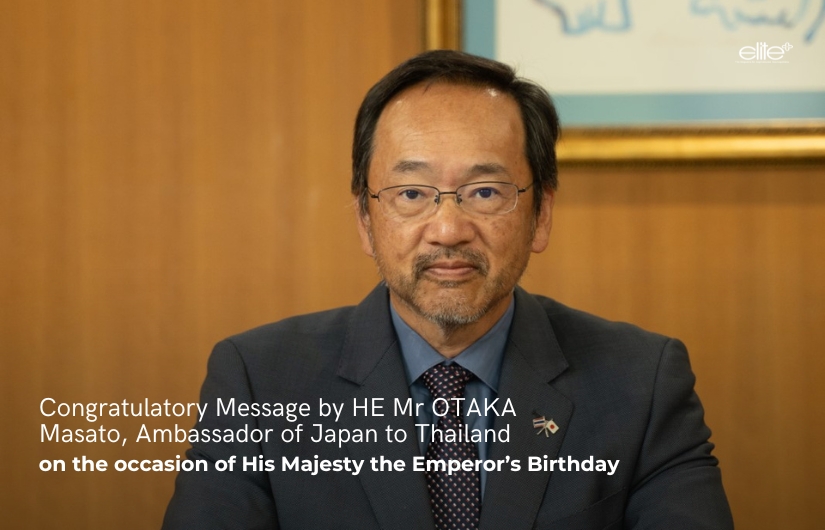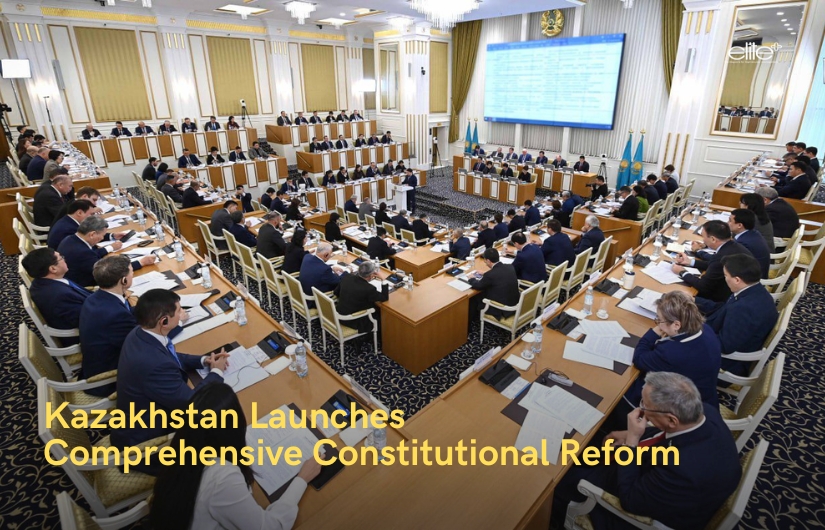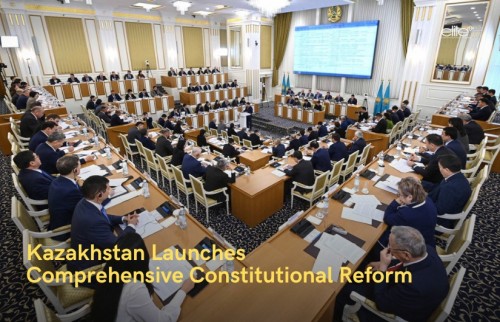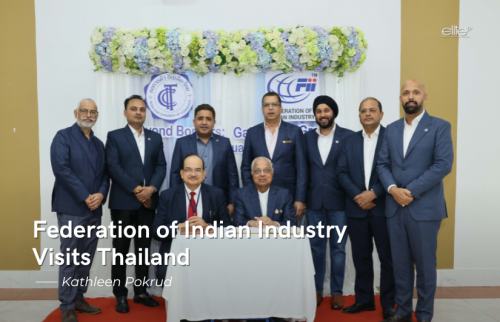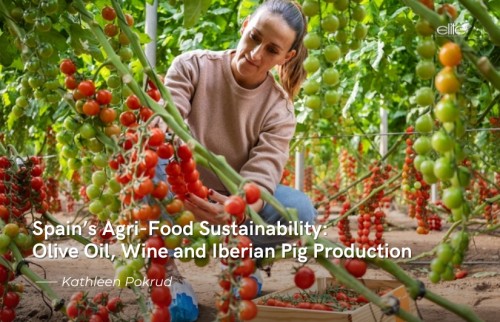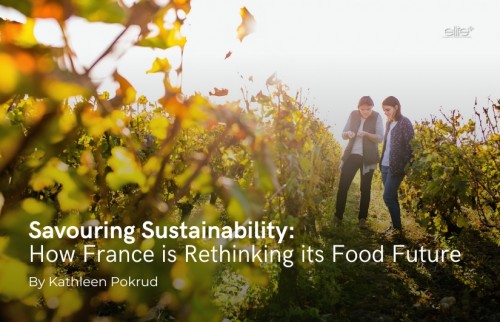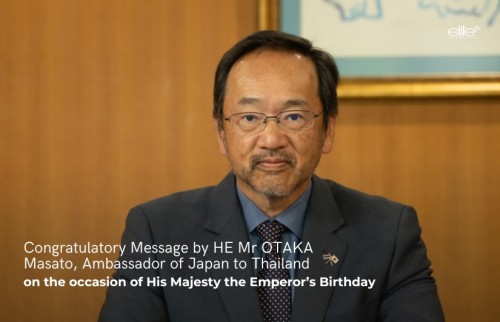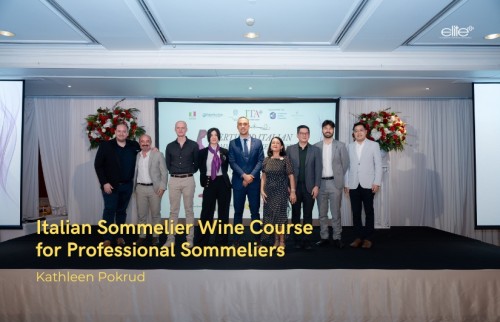“Economy 4.0” is a popular buzzword in Thailand, yet missing from the 4.0 brouhaha is whether the Thai economy and society have even reached version 3.0 yet.
For Harald Link, chairman of B. Grimm Group, Thailand’s economy might vary in readiness but one thing for certain is that Thai education is stuck in a bygone age. “Our education system has been in version 1.8 … like the old German education system dating back 100 years. But in Thailand, this old style of education is still ongoing.
The system does not encourage students to interrogate and think. Students don’t question.” Mr Link was speaking at a recent seminar on “Searching for the future of Thailand 4.0”, organized by the Thailand- China Business Council. Such a statement might upset some Thais, coming from someone who appears to be a blue-eyed, blond Caucasian, or farang. But his criticism is sincere, earnest and he speaks fluent Thai. Indeed, Mr Link is a naturalized Thai with a Thai ID. His ancestors came to Thailand over 130 years ago and he even has a Thai name.
The seminar placed the spotlight on Thailand’s future, especially on what it will take to create a version 4.0 economy. Mr Link stressed that Thailand’s education system needs serious reform. The traditional way students learn only for diplomas and degrees must be revised.
He suggested that educators and officials at the Ministry of Education adopt the German education system’s emphasis on vocational training. The Thai authorities should make it possible for students to work and go to class, and use experience of working in production plants for credit. “Learning must not be limited to schools. Companies are places for imparting knowledge, and they need to play a role,” he said.
William Heinecke, CEO and chairman of Minor Corporation, believes Thailand 4.0 will become a reality only when the country develops its human resources. Mr Heinecke, who grew up and studied at international school in Thailand, believes the only way to groom human resources is to improve education.
The country is too protective when it comes to opening the door to foreign talent, he pointed out, and that affects the learning curve in Thailand. “We have to drive much harder,” he said. “The education system has not changed much in so many years. People talk about Donald Trump trying to close the borders. But Thailand has been closing borders too. The country has prevented foreign teachers and other professions.
“Can we become world class in health care and wellness if we do not allow foreign medical professionals to come work in Thailand? I would say Google would not go far if they employed only Americans.”
Also a naturalized Thai citizen who speaks Thai fluently, Mr Heinecke said something that does give Thailand an advantage is its high quality infrastructure, which benefits from its location in the middle of Southeast Asia, sandwiched between Indochina to the east, Myanmar to the west, China to the north and the Malaysian Peninsula to the south, with plenty of coastal areas to support maritime industry.
Kobsak Phutrakul, assistant minister to the Prime Minister’s Office, agrees. “Political uncertainty makes the world more volatile and vulnerable,” he said. “But that uncertainty will benefit ASEAN as a relatively safe place for investment. It is time for ASEAN to rise.
“Thailand is lucky because ASEAN happens to be a major export market. Our country is located in the middle and we can become a hub that links logistics in the region.” The Thai government has already invested heavily in infrastructure such as highways and dual-track train lines to improve transportation connectivity in ASEAN, a market with over 600 million consumers.
Logistics and transport will also help Thailand become an economic hub for the CLMV – an initialism for the countries of the Mekong Sub-Region (Cambodia, Laos, Myanmar and Vietnam). The CLMV is touted as an emerging market for manufacturing. With over 240 million consumers, countries in the CLMV have shown excellent economic growth of around 7%.
“In the old days, when investors thought of Asia, they would think about India and China,” said Mr Kobsak. “With the global economic slowdown, ASEAN is becoming a new star and Thailand is geographically situated in the middle of region. So the rise of ASEAN is our opportunity and we must rise to the occasion.”
Recent Thai governments have completed 2,750 kilometres of highways for the ASEAN Economic Corridor that will link ASEAN with China’s One Belt, One Road initiative, a new economic belt linking East Asia with Russia and Europe.
The current government is also pushing ahead with the so-called Eastern Economic Corridor (EEC) on the eastern seaboard. The EEC will be the country’s new engine for investment, focusing on high-technology industries and an advanced transport system including high-speed trains, double-track rails, new ports and improvements to U-Tapao Airport.
The question arises, however, whether pricey infrastructure is the best way to reach Economy 4.0. Upgrading the economy requires skilled labour, research and innovation to create products with added value. This requires manpower versed in information technology.
Veerathai Santiprabhob, governor of the Bank of Thailand, urged the government and private sectors to make sure Thailand 4.0 would not be limited to manufacturers and businesspeople but would benefit the country as a whole through equal access to technology and innovation.
“We need to improve in order to jump on the bandwagon of Economy 4.0,” said Mr Veerathai. “Those who cannot adjust and acquire new technological skills or cannot access technology will be left behind, and then economic and social inequality will widen.”
As the government invests in infrastructure to be a logistics hub, the country faces huge challenges in developing its human resources. Thailand performs poorly in education rankings. The most recent is the Times Higher Education top 300 Asian university rankings released in March. Six out of 10 Thai universities have fallen in the rankings from last year, such as Mahidol University, which slipped from 90th to 97th. No Thai university is in the top 10, currently headed by the National University of Singapore, then Beijing University and Tsinghua University in China.
As the Times Higher Education report states, “The chances of Thailand being home to even one of the continent’s top 100 universities in the near future is also under threat.” Such a poor showing is not only the concern of education. Sliding down the rankings indicates that the country might not be the ideal place for research and innovation, and foreign high-tech companies may open offices and production bases in countries with more skilled manpower and business practices driven by innovation.

Mr Veerathai said the country is going to face major structural reforms to reach Economy 4.0. Technology including robots and artificial intelligence will make many jobs redundant and create a “sharing economy”, where the needs of ownership may go down and internet sharing platforms like the Uber cab-hailing service or Agoda will profit, not by producing or investing in products but by managing resource sharing.
“Technology can help Thailand leap forward from an agricultural base to modern service production, and technology can help producers cut costs and use less raw materials in production. The 4.0 version will transform the country and society in unimaginable ways.”
Mr Veerathai is concerned that small and medium-sized businesses will be left behind. There is evidence that local corporate giants such as PTT, SCG and CP Group have prepared for Economy 4.0 and invested in human resource capacity and research innovation.
A big concern is inequality resulting from poorer and less prepared groups not having the same access to technology.
“Those who cannot adjust or have access to technology will be left behind. Then inequality will grow in many industries such as media, agriculture, construction, and such problems will expand into social and political conflicts.”
Quoting a recent report from the World Economic Forum, Mr Veerathai said people do not want to see only economic growth; they need to see that growth is equally distributed and benefits them, not only enrich investors.
“By failing to distribute wealth equally, people, especially the less privileged and those who feel left behind, will change their social and political views; they will grow more inward, isolated and against globalization – sentiments which lead to the rise of nationalist movements such as Brexit and nationalist leaders such as Donald Trump.”
The way to prepare Thailand to deal with economic and social change brought by Economy 4.0 is to boost resilience and improve personality and mindset.
“Human resource development must not only be about learning what to do. The appropriate attitude is that learning must be a lifetime process. Each Thai must learn, no matter how young or old. Education must not be done when you receive a diploma or degree; it will end at the end of life and school is not limited to the classroom. Knowledge can be imparted in families, schools and offices.”
While the education system needs to be overhauled, Mr Veerathai said investors also need to acquire a new mindset. In Economy 4.0, innovation will help raise yields, reducing the amount of materials. New production equipment such as 3D printers, or sharing the manufacturing supply chain, will reduce the need for manufacturers to invest in huge machines to boost capacity.
“Investment must not only be to expand production capacity. Investors must put money into building capacity, increasing research and innovation and improving human resources to be able to work with technology.”
Kyoichi Tanada, president of Toyota Motor Thailand, stresses that Thais need to adjust in order to thrive in a more connected world.
“I insist that the Thai workforce can compete with anyone in the world,” said Mr Tanada, who also speaks Thai. “They are skilled and have potential.”
Mr Tanada admits neighbouring countries such as Indonesia, a market of over 240 million consumers, is competing with Thailand to become a major automotive hub. Yet Thailand has advanced manufacturing skills and the auto-parts manufacturing sector is still ahead of the game. For Economy 4.0, Mr Tanada believes that Thailand must make use of innovation to build more affordable smaller cars that consume less energy and use materials and a supply chain that help protect the environmen
Mr Tanada believes Thai workers do not have a problem with intelligence or skills, but can become too entrenched in their comfort zones.
“When I offer them a promotion and a move oversees, they often say no, even though I offer them more money. Thai workers do not want to get transferred to overseas positions. Perhaps Thailand is so beautiful and liveable and Thais are so enamoured with their sabai sabai [easy living] way of life.”


